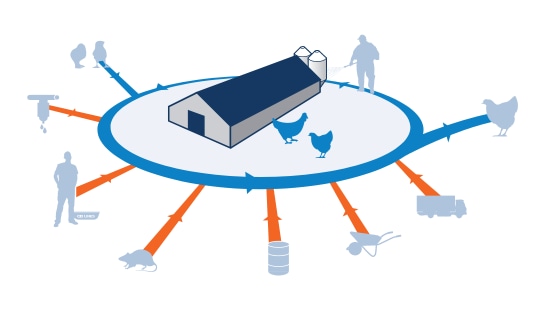
African Swine Fever Transmission and Prevention
African Swine Fever is a highly contagious, fast spreading and deadly viral disease affecting domestic pigs and wild boars; there is no cure or vaccine.
ASF threatens the production and livelihood of pig farms, and farmers must take a proactive approach and use proven methods to protect their livestock.
Learn how African Swine Fever is transmitted and what measures you can put in place to prevent ASF from being introduced to your farm.
African Swine Fever in Pigs
The ASF virus clings to clothing, equipment and vehicles, and it survives in animal feed, water and meat.
Pigs become infected with African Swine Fever by:
- Direct contact with an animal or carcass infected with ASF
- Being bitten by a soft tick (specific to Africa)
- Eating kitchen waste, food residue or meat products from animals infected with ASF
- Contaminated materials from hunters, farm materials or transportation vehicles
- Transmission from biting insects
Symptoms: High fever, loss of appetite, lethargy, skin bleeding and bloody diarrhea; acute mortality rate

Product Information
Contact your local sales representative for more information on the best solutions available to meet your needs.
How to Prevent African Swine Fever in Pigs
A biosecurity program with high-quality cleaning and disinfection products and protocols is critical to protect your farm against ASF.
The key areas of African Swine Fever biosecurity are entrance, transport and barn hygiene, drinking water hygiene and drinking water system cleaning and disinfection.
Tips for Preventing African Swine Fever
1. Never feed your animals garbage, leftover food or household waste.
2. Train all employees, visitors and truck drivers to use proper hygiene
products and protocols; good training is key to creating good hygiene habits.
3. Place boot baths outside the barn, at every entrance, and make sure they're maintained well.
4. Make sure transport vehicles coming to your farm are cleaned and disinfected properly.
5. Place disinfecting wheel baths and spraying bows at the entrance of your farm to avoid introduction and transmission of the virus via trucks.
6. Clean and disinfect your feed storage silos and drinking water lines after every cycle so virus can't spread via feed and drinking water.
7. Take samples of your drinking water source to ensure it is not contaminated.
African Swine Fever Webinar

Addressing ASF With Biosecurity
Disease prevention is critical to keeping farm animals healthy and resilient, and it all begins with biosecurity.
External biosecurity prevents new diseases from coming into the farm; internal biosecurity controls existing diseases inside the farm. Ecolab has specialties within both areas.
A comprehensive biosecurity program will help you avoid low performance, animal mortality, treatment costs, antibiotics, labor inefficiencies, feed costs, lab tests and poor market acceptance.
By reducing the introduction and spread of infectious diseases, you affect your production and your profit.


